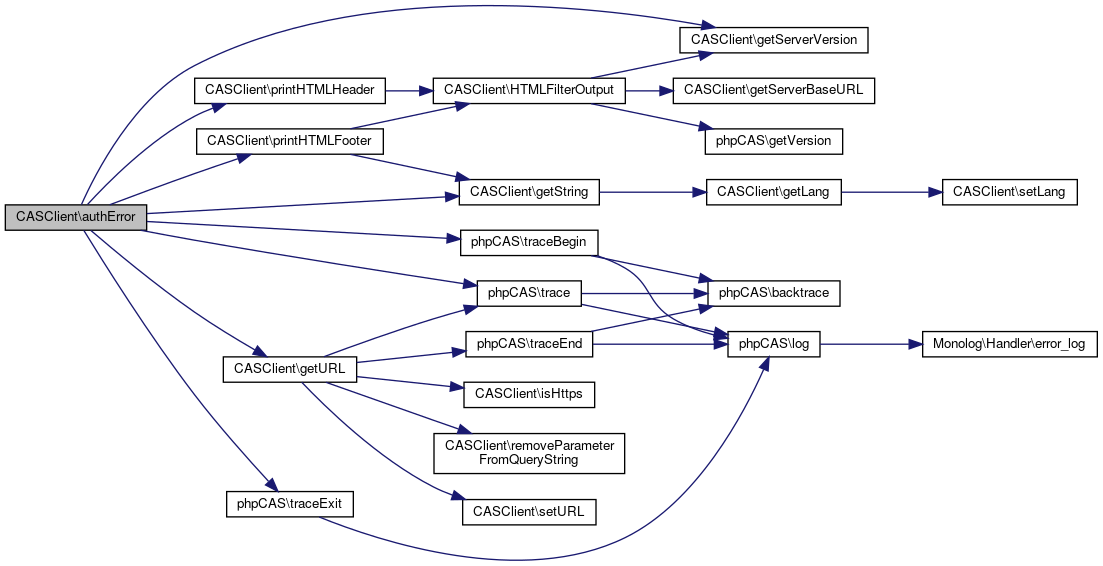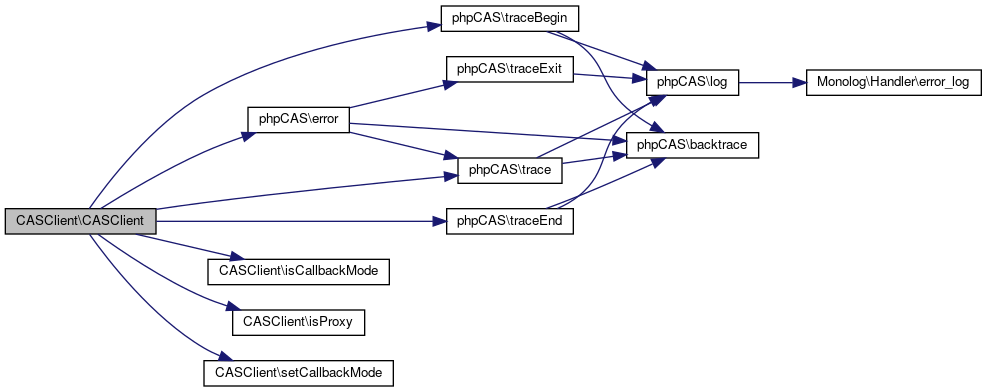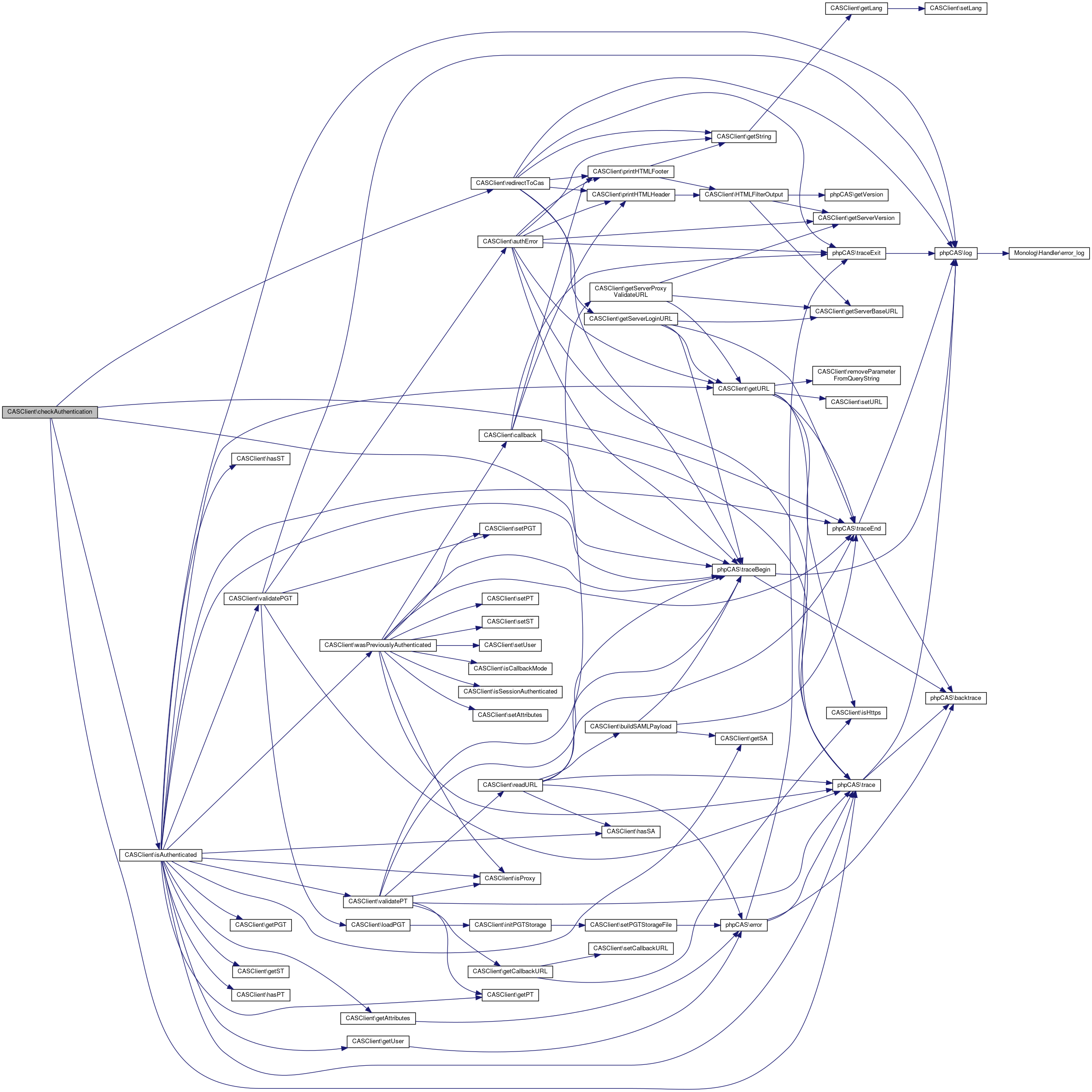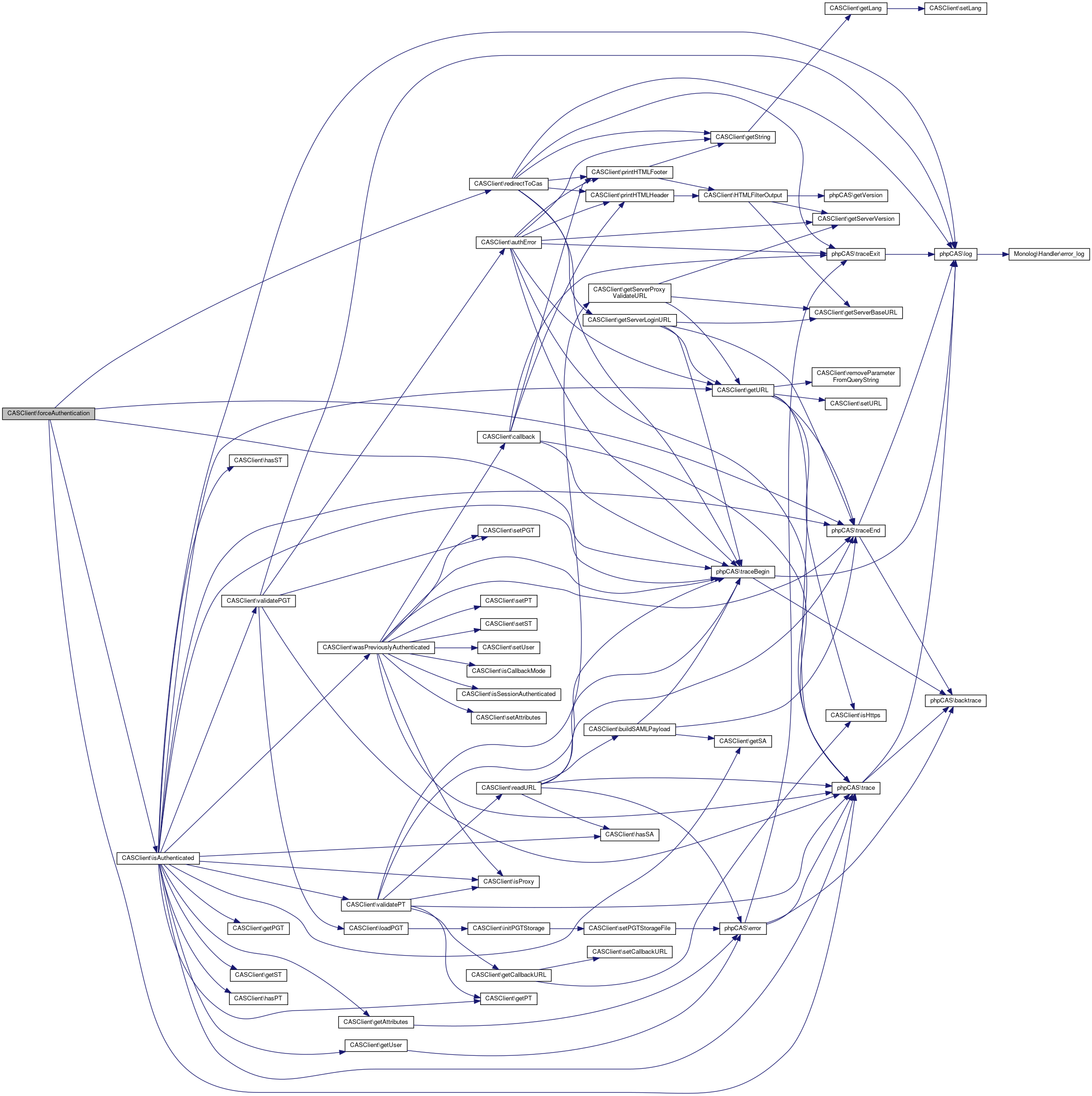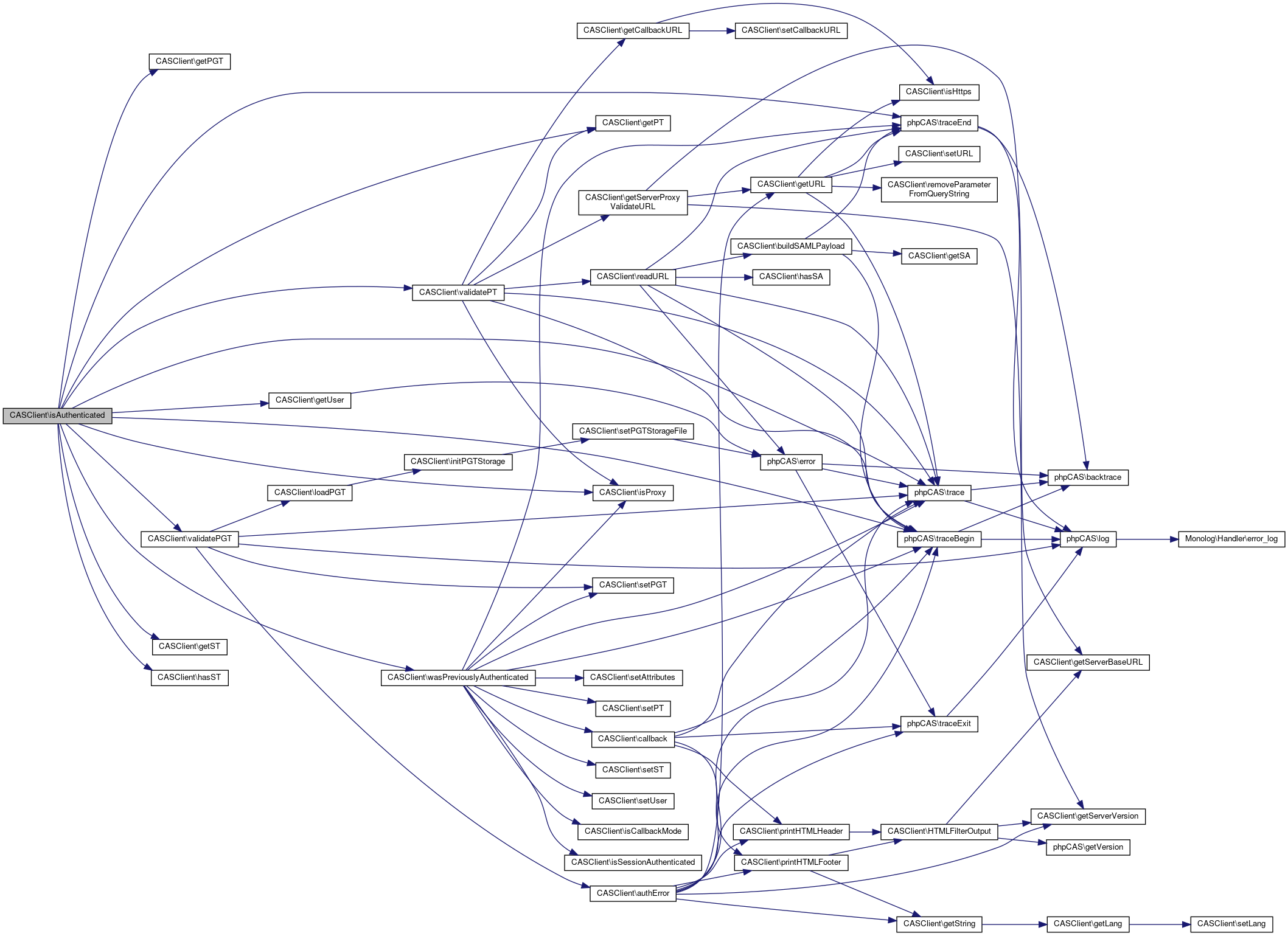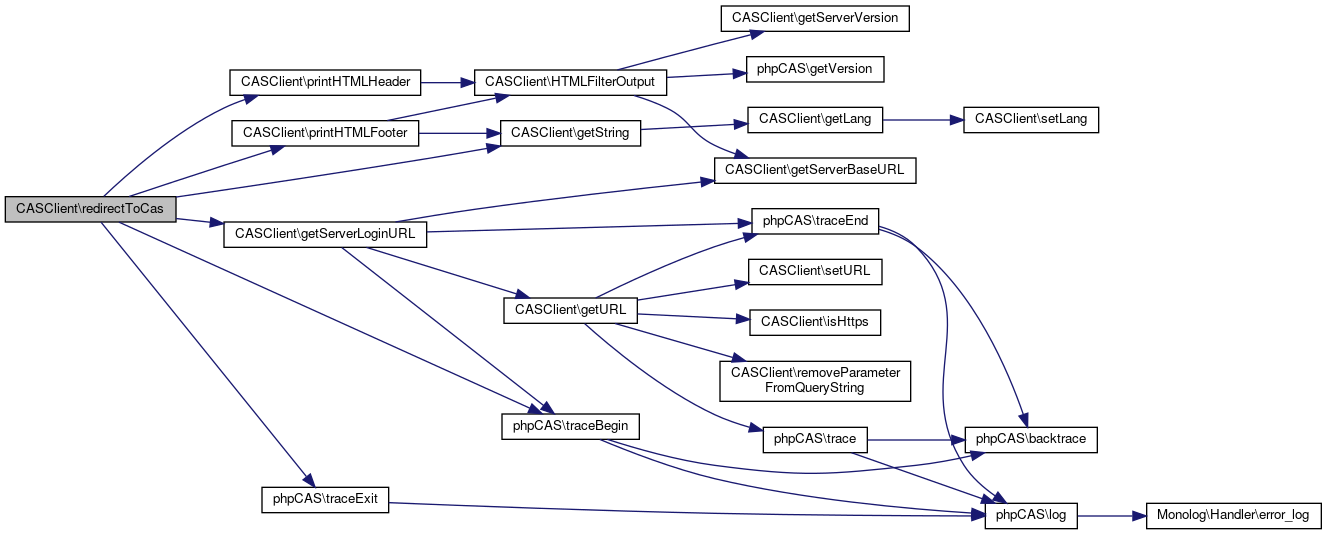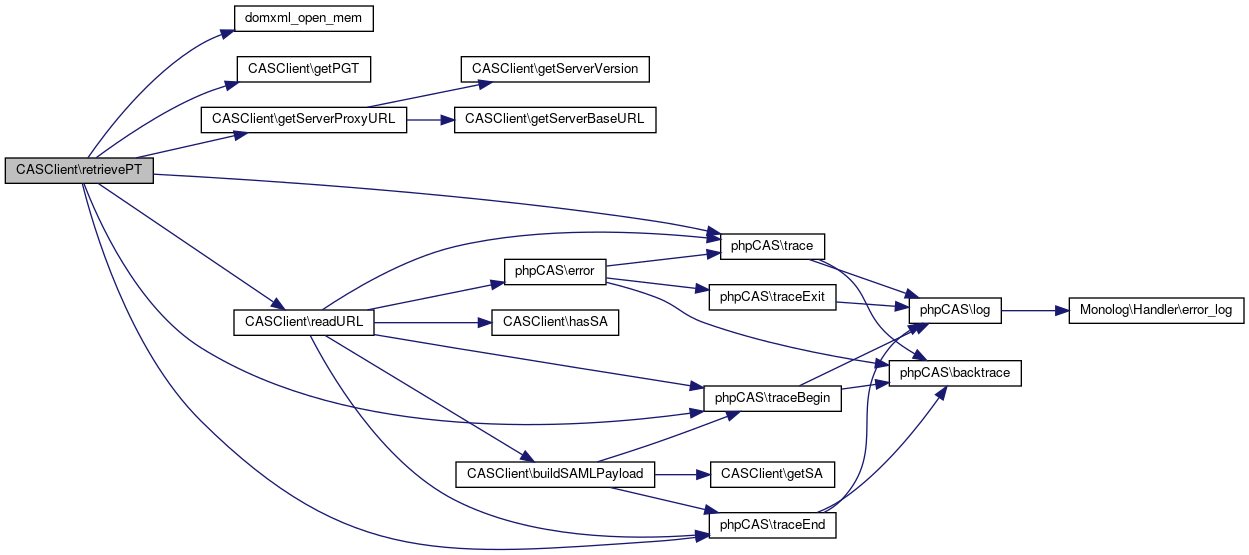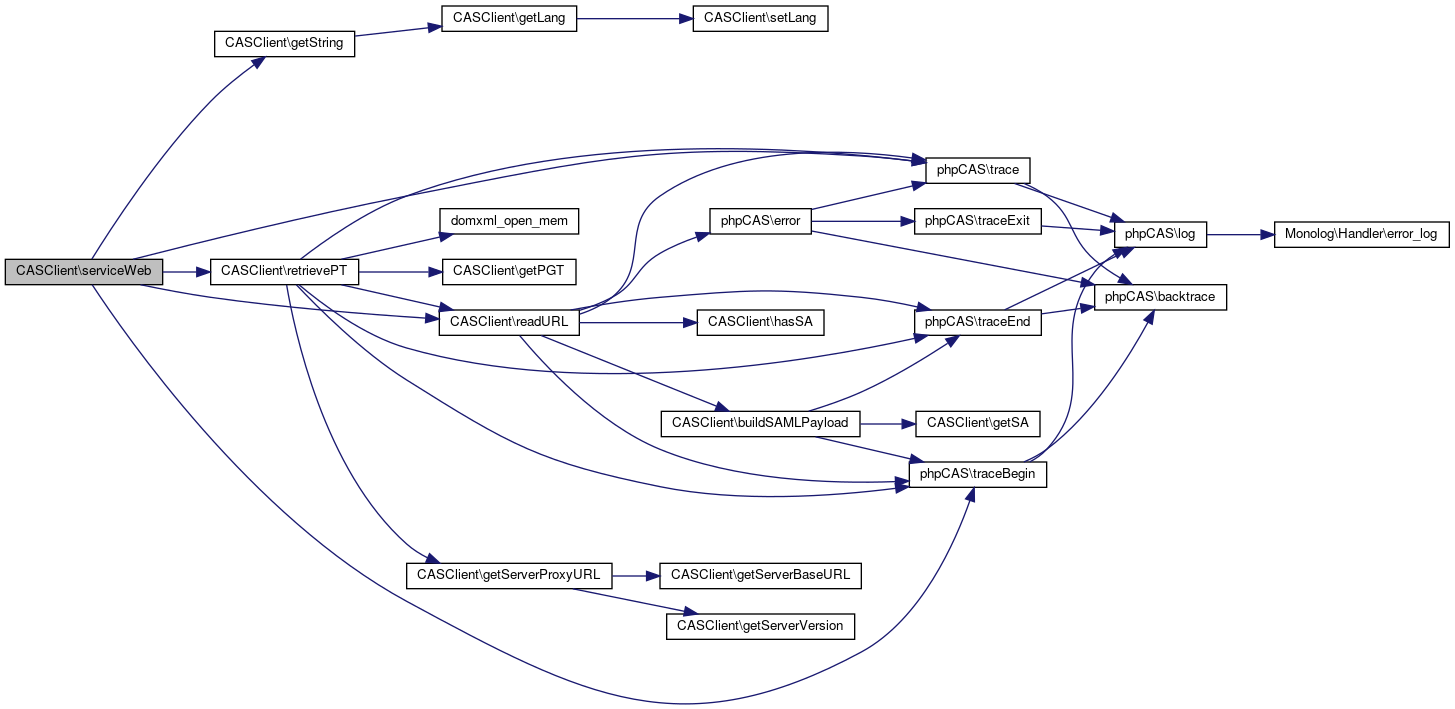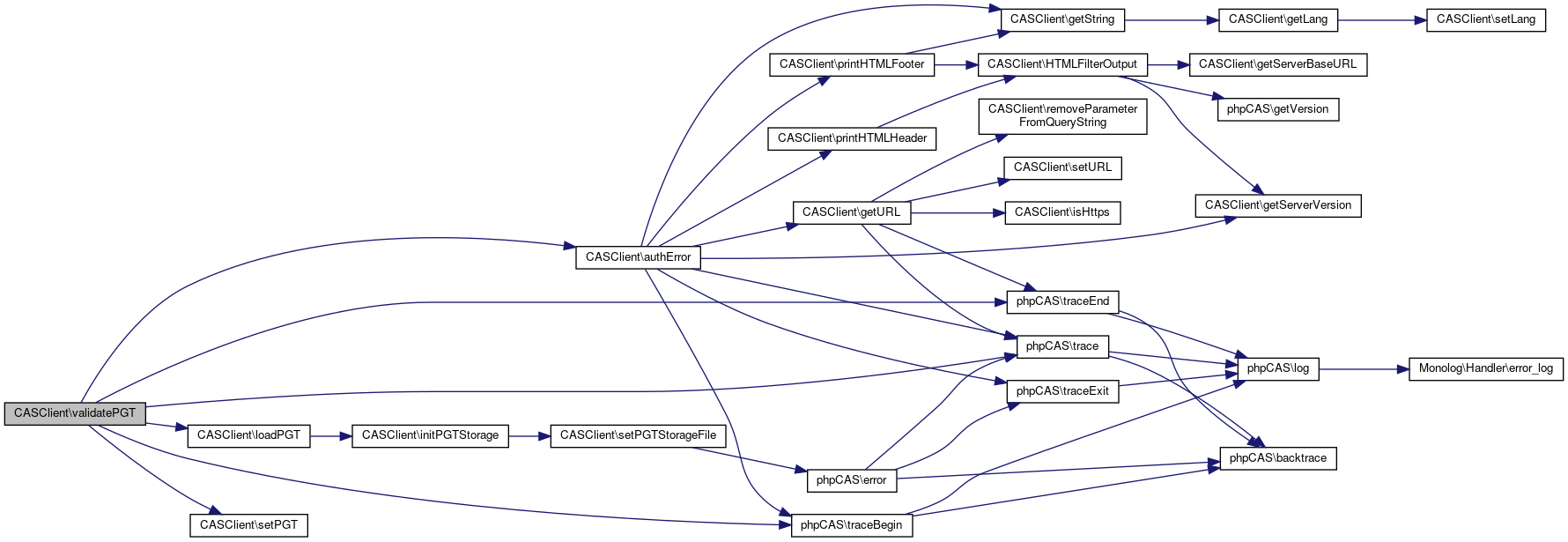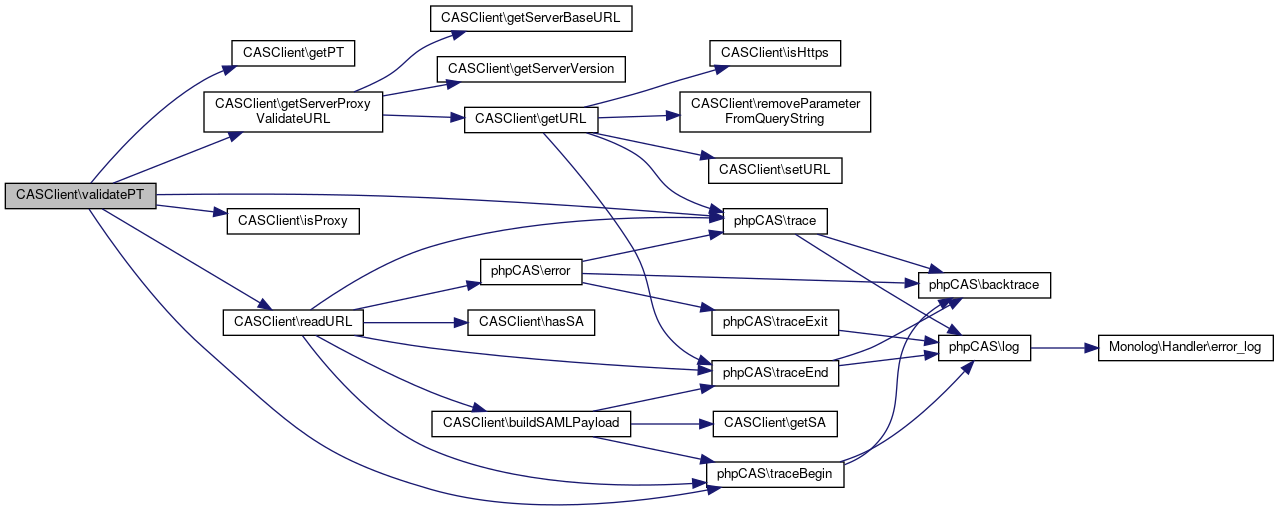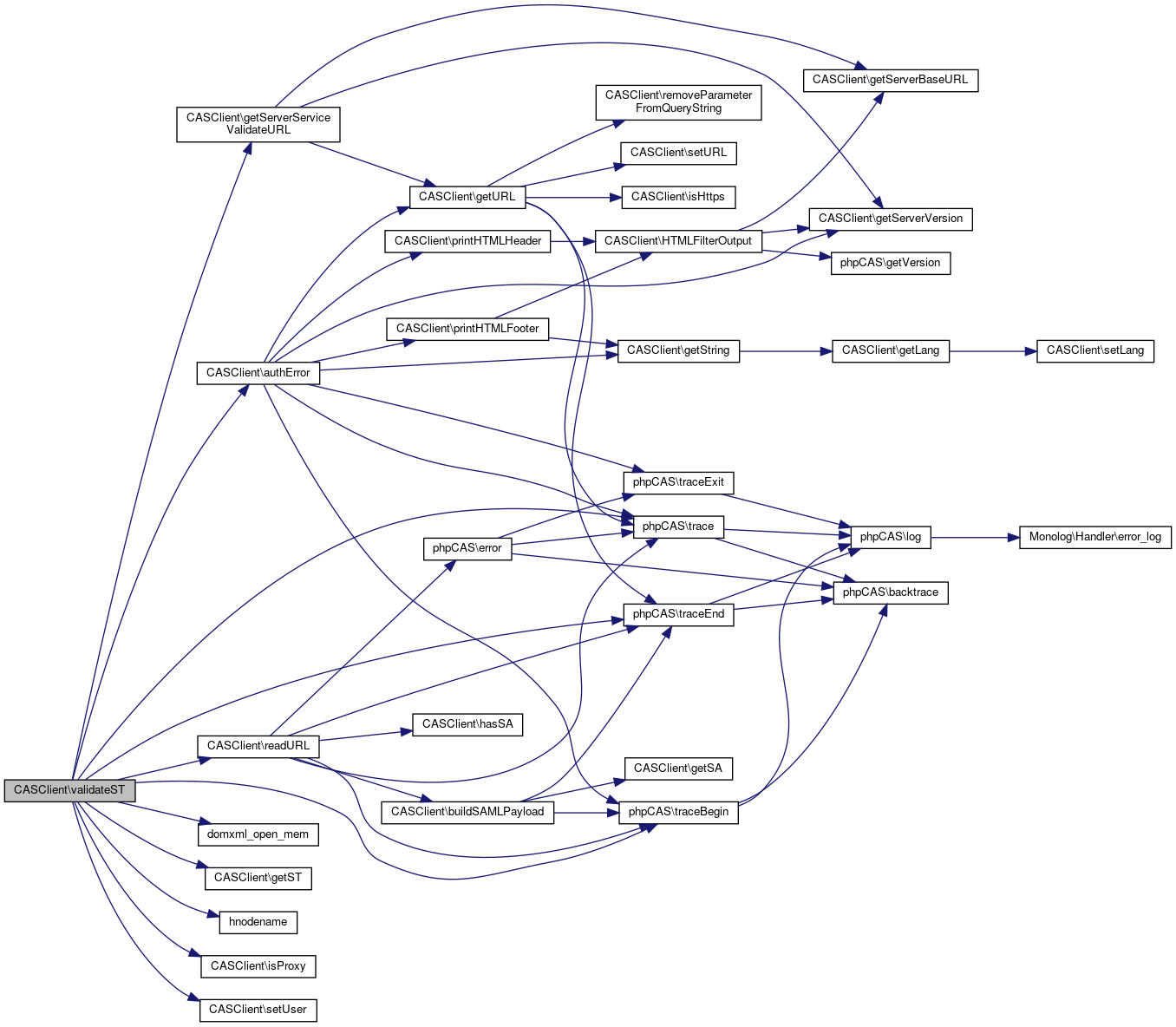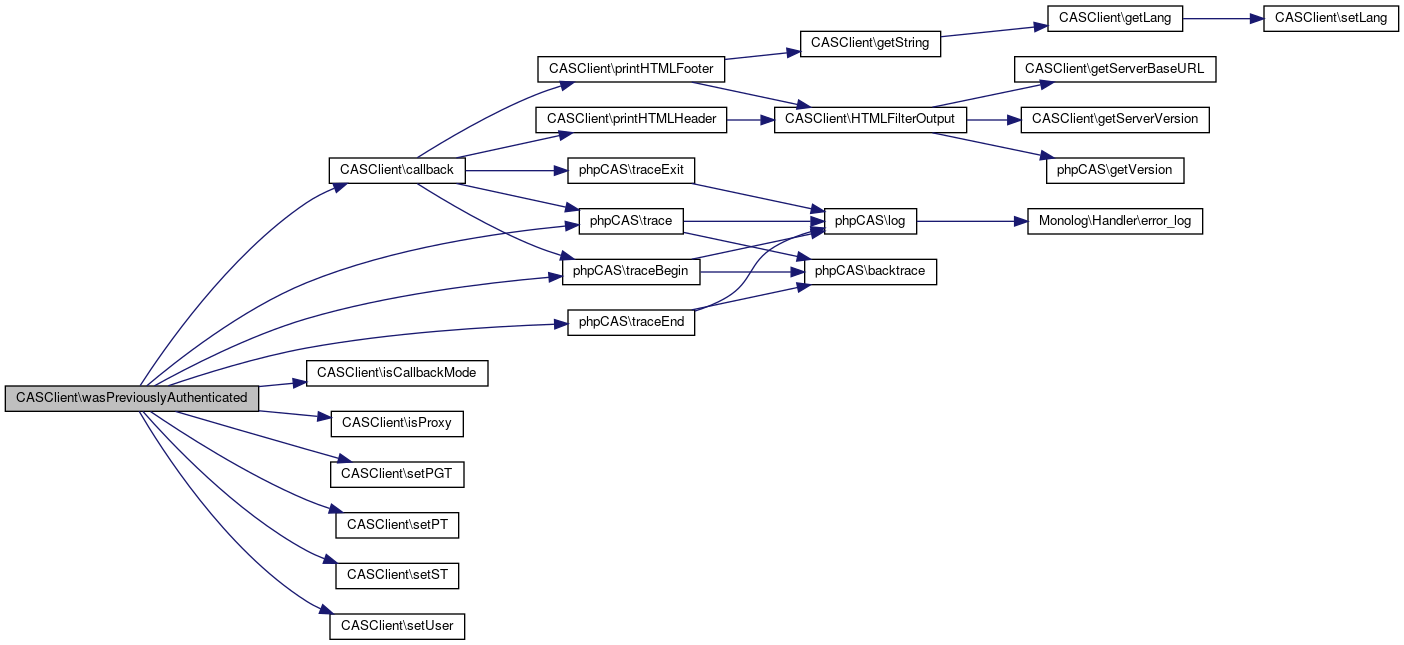The CASClient class is a client interface that provides CAS authentication to PHP applications. More...
 Collaboration diagram for CASClient:
Collaboration diagram for CASClient:Public Member Functions | |
| setHTMLHeader ($header) | |
| This method set the HTML header used for all outputs. More... | |
| setHTMLFooter ($footer) | |
| This method set the HTML footer used for all outputs. More... | |
| setLang ($lang) | |
| This method is used to set the language used by phpCAS. More... | |
| setExtraCurlOption ($key, $value) | |
| This method is used to set additional user curl options. More... | |
| CASClient ( $server_version, $proxy, $server_hostname, $server_port, $server_uri, $start_session=true) | |
| CASClient constructor. More... | |
| setStartSession ($session) | |
| getStartSession ($session) | |
| renameSession ($ticket) | |
| Renaming the session. More... | |
| getUser () | |
| This method returns the CAS user's login name. More... | |
| setAttributes ($attributes) | |
| getAttributes () | |
| hasAttributes () | |
| hasAttribute ($key) | |
| getAttribute ($key) | |
| renewAuthentication () | |
| This method is called to renew the authentication of the user If the user is authenticated, renew the connection If not, redirect to CAS. More... | |
| forceAuthentication () | |
| This method is called to be sure that the user is authenticated. More... | |
| setCacheTimesForAuthRecheck ($n) | |
| Set the number of times authentication will be cached before rechecked. More... | |
| checkAuthentication () | |
| This method is called to check whether the user is authenticated or not. More... | |
| isAuthenticated () | |
| This method is called to check if the user is authenticated (previously or by tickets given in the URL). More... | |
| isSessionAuthenticated () | |
| This method tells if the current session is authenticated. More... | |
| redirectToCas ($gateway=false, $renew=false) | |
| This method is used to redirect the client to the CAS server. More... | |
| logout ($params) | |
| This method is used to logout from CAS. More... | |
| handleLogoutRequests ($check_client=true, $allowed_clients=false) | |
| This method handles logout requests. More... | |
| setCasServerCert ($cert) | |
| Set the certificate of the CAS server. More... | |
| setCasServerCACert ($cert) | |
| Set the CA certificate of the CAS server. More... | |
| setNoCasServerValidation () | |
| Set no SSL validation for the CAS server. More... | |
| setPGTStorageFile ($format='', $path='') | |
| This method is used to tell phpCAS to store the response of the CAS server to PGT requests onto the filesystem. More... | |
| setPGTStorageDB ($user, $password, $database_type, $hostname, $port, $database, $table) | |
| This method is used to tell phpCAS to store the response of the CAS server to PGT requests into a database. More... | |
| _curl_read_headers ($ch, $header) | |
| serviceWeb ($url, &$err_code, &$output) | |
| This method is used to access an HTTP[S] service. More... | |
| serviceMail ($url, $service, $flags, &$err_code, &$err_msg, &$pt) | |
| This method is used to access an IMAP/POP3/NNTP service. More... | |
| removeParameterFromQueryString ($parameterName, $queryString) | |
| Removes a parameter from a query string. More... | |
| setHTMLHeader ($header) | |
| This method set the HTML header used for all outputs. More... | |
| setHTMLFooter ($footer) | |
| This method set the HTML footer used for all outputs. More... | |
| setLang ($lang) | |
| This method is used to set the language used by phpCAS. More... | |
| CASClient ($server_version, $proxy, $server_hostname, $server_port, $server_uri, $start_session=true) | |
| CASClient constructor. More... | |
| getUser () | |
| This method returns the CAS user's login name. More... | |
| forceAuthentication () | |
| This method is called to be sure that the user is authenticated. More... | |
| checkAuthentication () | |
| This method is called to check whether the ser is authenticated or not. More... | |
| isAuthenticated () | |
| This method is called to check if the user is authenticated (previously or by tickets given in the URL. More... | |
| redirectToCas ($gateway) | |
| This method is used to redirect the client to the CAS server. More... | |
| logout ($url="") | |
| This method is used to logout from CAS. More... | |
| setPGTStorageFile ($format='', $path='') | |
| This method is used to tell phpCAS to store the response of the CAS server to PGT requests onto the filesystem. More... | |
| setPGTStorageDB ($user, $password, $database_type, $hostname, $port, $database, $table) | |
| This method is used to tell phpCAS to store the response of the CAS server to PGT requests into a database. More... | |
| serviceWeb ($url, &$err_code, &$output) | |
| This method is used to access an HTTP[S] service. More... | |
| serviceMail ($url, $flags, &$err_code, &$err_msg, &$pt) | |
| This method is used to access an IMAP/POP3/NNTP service. More... | |
| setHTMLHeader ($header) | |
| This method set the HTML header used for all outputs. More... | |
| setHTMLFooter ($footer) | |
| This method set the HTML footer used for all outputs. More... | |
| setLang ($lang) | |
| This method is used to set the language used by phpCAS. More... | |
| CASClient ($server_version, $proxy, $server_hostname, $server_port, $server_uri, $start_session=true) | |
| CASClient constructor. More... | |
| getUser () | |
| This method returns the CAS user's login name. More... | |
| forceAuthentication () | |
| This method is called to be sure that the user is authenticated. More... | |
| checkAuthentication () | |
| This method is called to check whether the ser is authenticated or not. More... | |
| isAuthenticated () | |
| This method is called to check if the user is authenticated (previously or by tickets given in the URL. More... | |
| redirectToCas ($gateway) | |
| This method is used to redirect the client to the CAS server. More... | |
| logout ($url="") | |
| This method is used to logout from CAS. More... | |
| setPGTStorageFile ($format='', $path='') | |
| This method is used to tell phpCAS to store the response of the CAS server to PGT requests onto the filesystem. More... | |
| setPGTStorageDB ($user, $password, $database_type, $hostname, $port, $database, $table) | |
| This method is used to tell phpCAS to store the response of the CAS server to PGT requests into a database. More... | |
| serviceWeb ($url, &$err_code, &$output) | |
| This method is used to access an HTTP[S] service. More... | |
| serviceMail ($url, $flags, &$err_code, &$err_msg, &$pt) | |
| This method is used to access an IMAP/POP3/NNTP service. More... | |
Data Fields | |
| $_curl_options = array() | |
| An array to store extra curl options. More... | |
| $_curl_headers = array() | |
| This method is the callback used by readURL method to request HTTP headers. More... | |
Private Member Functions | |
| HTMLFilterOutput ($str) | |
| This method filters a string by replacing special tokens by appropriate values and prints it. More... | |
| printHTMLHeader ($title) | |
| This method prints the header of the HTML output (after filtering). More... | |
| printHTMLFooter () | |
| This method prints the footer of the HTML output (after filtering). More... | |
| getLang () | |
| This method returns the language used by phpCAS. More... | |
| getString ($str) | |
| This method returns a string depending on the language. More... | |
| getServerVersion () | |
| This method is used to retrieve the version of the CAS server. More... | |
| getServerHostname () | |
| This method is used to retrieve the hostname of the CAS server. More... | |
| getServerPort () | |
| This method is used to retrieve the port of the CAS server. More... | |
| getServerURI () | |
| This method is used to retrieve the URI of the CAS server. More... | |
| getServerBaseURL () | |
| This method is used to retrieve the base URL of the CAS server. More... | |
| getServerLoginURL ($gateway=false, $renew=false) | |
| This method is used to retrieve the login URL of the CAS server. More... | |
| setServerLoginURL ($url) | |
| This method sets the login URL of the CAS server. More... | |
| setServerServiceValidateURL ($url) | |
| This method sets the serviceValidate URL of the CAS server. More... | |
| setServerProxyValidateURL ($url) | |
| This method sets the proxyValidate URL of the CAS server. More... | |
| setServerSamlValidateURL ($url) | |
| This method sets the samlValidate URL of the CAS server. More... | |
| getServerServiceValidateURL () | |
| This method is used to retrieve the service validating URL of the CAS server. More... | |
| getServerSamlValidateURL () | |
| This method is used to retrieve the SAML validating URL of the CAS server. More... | |
| getServerProxyValidateURL () | |
| This method is used to retrieve the proxy validating URL of the CAS server. More... | |
| getServerProxyURL () | |
| This method is used to retrieve the proxy URL of the CAS server. More... | |
| getServerLogoutURL () | |
| This method is used to retrieve the logout URL of the CAS server. More... | |
| setServerLogoutURL ($url) | |
| This method sets the logout URL of the CAS server. More... | |
| isHttps () | |
| This method checks to see if the request is secured via HTTPS. More... | |
| setUser ($user) | |
| This method sets the CAS user's login name. More... | |
| wasPreviouslyAuthenticated () | |
| This method tells if the user has already been (previously) authenticated by looking into the session variables. More... | |
| isLogoutRequest () | |
| isLogoutRequestAllowed () | |
| getST () | |
| This method returns the Service Ticket provided in the URL of the request. More... | |
| setST ($st) | |
| This method stores the Service Ticket. More... | |
| hasST () | |
| This method tells if a Service Ticket was stored. More... | |
| validateST ($validate_url, &$text_response, &$tree_response) | |
| This method is used to validate a ST; halt on failure, and sets $validate_url, $text_reponse and $tree_response on success. More... | |
| validateSA ($validate_url, &$text_response, &$tree_response) | |
| This method is used to validate a SAML TICKET; halt on failure, and sets $validate_url, $text_reponse and $tree_response on success. More... | |
| setSessionAttributes ($text_response) | |
| This method will parse the DOM and pull out the attributes from the SAML payload and put them into an array, then put the array into the session. More... | |
| isProxy () | |
| Tells if a CAS client is a CAS proxy or not. More... | |
| getPGT () | |
| This method returns the Proxy Granting Ticket given by the CAS server. More... | |
| setPGT ($pgt) | |
| This method stores the Proxy Granting Ticket. More... | |
| hasPGT () | |
| This method tells if a Proxy Granting Ticket was stored. More... | |
| setCallbackMode ($callback_mode) | |
| This method sets/unsets callback mode. More... | |
| isCallbackMode () | |
| This method returns TRUE when the CAs client is running i callback mode, FALSE otherwise. More... | |
| getCallbackURL () | |
| This method returns the URL that should be used for the PGT callback (in fact the URL of the current request without any CGI parameter, except if phpCAS::setFixedCallbackURL() was used). More... | |
| setCallbackURL ($url) | |
| This method sets the callback url. More... | |
| callback () | |
| This method is called by CASClient::CASClient() when running in callback mode. More... | |
| initPGTStorage () | |
| This method is used to initialize the storage of PGT's. More... | |
| storePGT ($pgt, $pgt_iou) | |
| This method stores a PGT. More... | |
| loadPGT ($pgt_iou) | |
| This method reads a PGT from its Iou and deletes the corresponding storage entry. More... | |
| validatePGT (&$validate_url, $text_response, $tree_response) | |
| This method is used to validate a PGT; halt on failure. More... | |
| retrievePT ($target_service, &$err_code, &$err_msg) | |
| This method is used to retrieve PT's from the CAS server thanks to a PGT. More... | |
| readURL ($url, $cookies, &$headers, &$body, &$err_msg) | |
| This method is used to acces a remote URL. More... | |
| buildSAMLPayload () | |
| This method is used to build the SAML POST body sent to /samlValidate URL. More... | |
| getPT () | |
| This method returns the Proxy Ticket provided in the URL of the request. More... | |
| setPT ($pt) | |
| This method stores the Proxy Ticket. More... | |
| hasPT () | |
| This method tells if a Proxy Ticket was stored. More... | |
| getSA () | |
| This method returns the SAML Ticket provided in the URL of the request. More... | |
| setSA ($sa) | |
| This method stores the SAML Ticket. More... | |
| hasSA () | |
| This method tells if a SAML Ticket was stored. More... | |
| validatePT (&$validate_url, &$text_response, &$tree_response) | |
| This method is used to validate a ST or PT; halt on failure Used for all CAS 2.0 validations. More... | |
| getURL () | |
| This method returns the URL of the current request (without any ticket CGI parameter). More... | |
| setURL ($url) | |
| This method sets the URL of the current request. More... | |
| authError ($failure, $cas_url, $no_response, $bad_response='', $cas_response='', $err_code='', $err_msg='') | |
| This method is used to print the HTML output when the user was not authenticated. More... | |
| HTMLFilterOutput ($str) | |
| This method filters a string by replacing special tokens by appropriate values and prints it. More... | |
| printHTMLHeader ($title) | |
| This method prints the header of the HTML output (after filtering). More... | |
| printHTMLFooter () | |
| This method prints the footer of the HTML output (after filtering). More... | |
| getLang () | |
| This method returns the language used by phpCAS. More... | |
| getString ($str) | |
| This method returns a string depending on the language. More... | |
| getServerVersion () | |
| This method is used to retrieve the version of the CAS server. More... | |
| getServerHostname () | |
| This method is used to retrieve the hostname of the CAS server. More... | |
| getServerPort () | |
| This method is used to retrieve the port of the CAS server. More... | |
| getServerURI () | |
| This method is used to retrieve the URI of the CAS server. More... | |
| getServerBaseURL () | |
| This method is used to retrieve the base URL of the CAS server. More... | |
| getServerLoginURL ($gateway) | |
| This method is used to retrieve the login URL of the CAS server. More... | |
| getServerServiceValidateURL () | |
| This method is used to retrieve the service validating URL of the CAS server. More... | |
| getServerProxyValidateURL () | |
| This method is used to retrieve the proxy validating URL of the CAS server. More... | |
| getServerProxyURL () | |
| This method is used to retrieve the proxy URL of the CAS server. More... | |
| getServerLogoutURL () | |
| This method is used to retrieve the logout URL of the CAS server. More... | |
| setUser ($user) | |
| This method sets the CAS user's login name. More... | |
| wasPreviouslyAuthenticated () | |
| This method tells if the user has already been (previously) authenticated by looking into the session variables. More... | |
| getST () | |
| This method returns the Service Ticket provided in the URL of the request. More... | |
| setST ($st) | |
| This method stores the Service Ticket. More... | |
| hasST () | |
| This method tells if a Service Ticket was stored. More... | |
| validateST ($validate_url, &$text_response, &$tree_response) | |
| This method is used to validate a ST; halt on failure, and sets $validate_url, $text_reponse and $tree_response on success. More... | |
| isProxy () | |
| Tells if a CAS client is a CAS proxy or not. More... | |
| getPGT () | |
| This method returns the Proxy Granting Ticket given by the CAS server. More... | |
| setPGT ($pgt) | |
| This method stores the Proxy Granting Ticket. More... | |
| hasPGT () | |
| This method tells if a Proxy Granting Ticket was stored. More... | |
| setCallbackMode ($callback_mode) | |
| This method sets/unsets callback mode. More... | |
| isCallbackMode () | |
| This method returns TRUE when the CAs client is running i callback mode, FALSE otherwise. More... | |
| getCallbackURL () | |
| This method returns the URL that should be used for the PGT callback (in fact the URL of the current request without any CGI parameter, except if phpCAS::setFixedCallbackURL() was used). More... | |
| setCallbackURL ($url) | |
| This method sets the callback url. More... | |
| callback () | |
| This method is called by CASClient::CASClient() when running in callback mode. More... | |
| initPGTStorage () | |
| This method is used to initialize the storage of PGT's. More... | |
| storePGT ($pgt, $pgt_iou) | |
| This method stores a PGT. More... | |
| loadPGT ($pgt_iou) | |
| This method reads a PGT from its Iou and deletes the corresponding storage entry. More... | |
| validatePGT (&$validate_url, $text_response, $tree_response) | |
| This method is used to validate a PGT; halt on failure. More... | |
| retrievePT ($target_service, &$err_code, &$err_msg) | |
| This method is used to retrieve PT's from the CAS server thanks to a PGT. More... | |
| readURL ($url, $cookies, &$headers, &$body, &$err_msg) | |
| This method is used to acces a remote URL. More... | |
| getPT () | |
| This method returns the Proxy Ticket provided in the URL of the request. More... | |
| setPT ($pt) | |
| This method stores the Proxy Ticket. More... | |
| hasPT () | |
| This method tells if a Proxy Ticket was stored. More... | |
| validatePT (&$validate_url, &$text_response, &$tree_response) | |
| This method is used to validate a PT; halt on failure. More... | |
| getURL () | |
| This method returns the URL of the current request (without any ticket CGI parameter). More... | |
| setURL ($url) | |
| This method sets the URL of the current request. More... | |
| authError ($failure, $cas_url, $no_response, $bad_response='', $cas_response='', $err_code='', $err_msg='') | |
| This method is used to print the HTML output when the user was not authenticated. More... | |
| HTMLFilterOutput ($str) | |
| This method filters a string by replacing special tokens by appropriate values and prints it. More... | |
| printHTMLHeader ($title) | |
| This method prints the header of the HTML output (after filtering). More... | |
| printHTMLFooter () | |
| This method prints the footer of the HTML output (after filtering). More... | |
| getLang () | |
| This method returns the language used by phpCAS. More... | |
| getString ($str) | |
| This method returns a string depending on the language. More... | |
| getServerVersion () | |
| This method is used to retrieve the version of the CAS server. More... | |
| getServerHostname () | |
| This method is used to retrieve the hostname of the CAS server. More... | |
| getServerPort () | |
| This method is used to retrieve the port of the CAS server. More... | |
| getServerURI () | |
| This method is used to retrieve the URI of the CAS server. More... | |
| getServerBaseURL () | |
| This method is used to retrieve the base URL of the CAS server. More... | |
| getServerLoginURL ($gateway) | |
| This method is used to retrieve the login URL of the CAS server. More... | |
| getServerServiceValidateURL () | |
| This method is used to retrieve the service validating URL of the CAS server. More... | |
| getServerProxyValidateURL () | |
| This method is used to retrieve the proxy validating URL of the CAS server. More... | |
| getServerProxyURL () | |
| This method is used to retrieve the proxy URL of the CAS server. More... | |
| getServerLogoutURL () | |
| This method is used to retrieve the logout URL of the CAS server. More... | |
| setUser ($user) | |
| This method sets the CAS user's login name. More... | |
| wasPreviouslyAuthenticated () | |
| This method tells if the user has already been (previously) authenticated by looking into the session variables. More... | |
| getST () | |
| This method returns the Service Ticket provided in the URL of the request. More... | |
| setST ($st) | |
| This method stores the Service Ticket. More... | |
| hasST () | |
| This method tells if a Service Ticket was stored. More... | |
| validateST ($validate_url, &$text_response, &$tree_response) | |
| This method is used to validate a ST; halt on failure, and sets $validate_url, $text_reponse and $tree_response on success. More... | |
| isProxy () | |
| Tells if a CAS client is a CAS proxy or not. More... | |
| getPGT () | |
| This method returns the Proxy Granting Ticket given by the CAS server. More... | |
| setPGT ($pgt) | |
| This method stores the Proxy Granting Ticket. More... | |
| hasPGT () | |
| This method tells if a Proxy Granting Ticket was stored. More... | |
| setCallbackMode ($callback_mode) | |
| This method sets/unsets callback mode. More... | |
| isCallbackMode () | |
| This method returns TRUE when the CAs client is running i callback mode, FALSE otherwise. More... | |
| getCallbackURL () | |
| This method returns the URL that should be used for the PGT callback (in fact the URL of the current request without any CGI parameter, except if phpCAS::setFixedCallbackURL() was used). More... | |
| setCallbackURL ($url) | |
| This method sets the callback url. More... | |
| callback () | |
| This method is called by CASClient::CASClient() when running in callback mode. More... | |
| initPGTStorage () | |
| This method is used to initialize the storage of PGT's. More... | |
| storePGT ($pgt, $pgt_iou) | |
| This method stores a PGT. More... | |
| loadPGT ($pgt_iou) | |
| This method reads a PGT from its Iou and deletes the corresponding storage entry. More... | |
| validatePGT (&$validate_url, $text_response, $tree_response) | |
| This method is used to validate a PGT; halt on failure. More... | |
| retrievePT ($target_service, &$err_code, &$err_msg) | |
| This method is used to retrieve PT's from the CAS server thanks to a PGT. More... | |
| readURL ($url, $cookies, &$headers, &$body, &$err_msg) | |
| This method is used to acces a remote URL. More... | |
| getPT () | |
| This method returns the Proxy Ticket provided in the URL of the request. More... | |
| setPT ($pt) | |
| This method stores the Proxy Ticket. More... | |
| hasPT () | |
| This method tells if a Proxy Ticket was stored. More... | |
| validatePT (&$validate_url, &$text_response, &$tree_response) | |
| This method is used to validate a PT; halt on failure. More... | |
| getURL () | |
| This method returns the URL of the current request (without any ticket CGI parameter). More... | |
| setURL ($url) | |
| This method sets the URL of the current request. More... | |
| authError ($failure, $cas_url, $no_response, $bad_response='', $cas_response='', $err_code='', $err_msg='') | |
| This method is used to print the HTML output when the user was not authenticated. More... | |
Private Attributes | |
| $_output_header | |
| A string used to print the header of HTML pages. More... | |
| $_output_footer | |
| A string used to print the footer of HTML pages. More... | |
| $_lang | |
| A string corresponding to the language used by phpCAS. More... | |
| $_strings | |
| array containing the strings used by phpCAS. More... | |
| $_server | |
| a record to store information about the CAS server. More... | |
| $_start_session | |
| A variable to whether phpcas will use its own session handling. More... | |
| $_user | |
| The Authenticated user. More... | |
| $_attributes | |
| The Authenticated users attributes. More... | |
| $_cache_times_for_auth_recheck | |
| An integer that gives the number of times authentication will be cached before rechecked. More... | |
| $_st | |
| the Service Ticket provided in the URL of the request if present (empty otherwise). More... | |
| $_cas_server_cert | |
| the certificate of the CAS server. More... | |
| $_cas_server_ca_cert | |
| the certificate of the CAS server CA. More... | |
| $_no_cas_server_validation | |
| Set to true not to validate the CAS server. More... | |
| $_proxy | |
| A boolean telling if the client is a CAS proxy or not. More... | |
| $_pgt | |
| the Proxy Grnting Ticket given by the CAS server (empty otherwise). More... | |
| $_callback_mode | |
| each PHP script using phpCAS in proxy mode is its own callback to get the PGT back from the CAS server. More... | |
| $_callback_url | |
| the URL that should be used for the PGT callback (in fact the URL of the current request without any CGI parameter). More... | |
| $_pgt_storage | |
| an instance of a class inheriting of PGTStorage, used to deal with PGT storage. More... | |
| $_pt | |
| the Proxy Ticket provided in the URL of the request if present (empty otherwise). More... | |
| $_url | |
| the URL of the current request (without any ticket CGI parameter). More... | |
Detailed Description
The CASClient class is a client interface that provides CAS authentication to PHP applications.
Definition at line 51 of file client.php.
Member Function Documentation
◆ authError() [1/2]
|
private |
This method is used to print the HTML output when the user was not authenticated.
- Parameters
-
$failure the failure that occured $cas_url the URL the CAS server was asked for $no_response the response from the CAS server (other parameters are ignored if TRUE) $bad_response bad response from the CAS server ($err_code and $err_msg ignored if TRUE) $cas_response the response of the CAS server $err_code the error code given by the CAS server $err_msg the error message given by the CAS server
Definition at line 1919 of file client.php.
References $_SERVER, $failure, CAS_STR_AUTHENTICATION_FAILED, CAS_STR_YOU_WERE_NOT_AUTHENTICATED, CAS_VERSION_1_0, CAS_VERSION_2_0, exit, phpCAS\trace(), phpCAS\traceBegin(), and phpCAS\traceExit().
 Here is the call graph for this function:
Here is the call graph for this function:◆ authError() [2/2]
|
private |
This method is used to print the HTML output when the user was not authenticated.
- Parameters
-
$failure the failure that occured $cas_url the URL the CAS server was asked for $no_response the response from the CAS server (other parameters are ignored if TRUE) $bad_response bad response from the CAS server ($err_code and $err_msg ignored if TRUE) $cas_response the response of the CAS server $err_code the error code given by the CAS server $err_msg the error message given by the CAS server
Definition at line 1927 of file client4.php.
References $_SERVER, $failure, CAS_STR_AUTHENTICATION_FAILED, CAS_STR_YOU_WERE_NOT_AUTHENTICATED, CAS_VERSION_1_0, CAS_VERSION_2_0, exit, phpCAS\trace(), phpCAS\traceBegin(), and phpCAS\traceExit().
 Here is the call graph for this function:
Here is the call graph for this function:◆ callback() [1/2]
|
private |
This method is called by CASClient::CASClient() when running in callback mode.
It stores the PGT and its PGT Iou, prints its output and halts.
Definition at line 1161 of file client.php.
References $_GET, phpCAS\trace(), phpCAS\traceBegin(), and phpCAS\traceExit().
 Here is the call graph for this function:
Here is the call graph for this function:◆ callback() [2/2]
|
private |
This method is called by CASClient::CASClient() when running in callback mode.
It stores the PGT and its PGT Iou, prints its output and halts.
Definition at line 1169 of file client4.php.
References $_GET, phpCAS\trace(), phpCAS\traceBegin(), and phpCAS\traceExit().
 Here is the call graph for this function:
Here is the call graph for this function:◆ CASClient() [1/2]
| CASClient::CASClient | ( | $server_version, | |
| $proxy, | |||
| $server_hostname, | |||
| $server_port, | |||
| $server_uri, | |||
$start_session = true |
|||
| ) |
CASClient constructor.
- Parameters
-
$server_version the version of the CAS server $proxy TRUE if the CAS client is a CAS proxy, FALSE otherwise $server_hostname the hostname of the CAS server $server_port the port the CAS server is running on $server_uri the URI the CAS server is responding on $start_session Have phpCAS start PHP sessions (default true)
- Returns
- a newly created CASClient object
Definition at line 435 of file client.php.
References $_GET, $_SERVER, CAS_VERSION_1_0, CAS_VERSION_2_0, phpCAS\error(), isCallbackMode(), isProxy(), setCallbackMode(), phpCAS\trace(), phpCAS\traceBegin(), and phpCAS\traceEnd().
 Here is the call graph for this function:
Here is the call graph for this function:◆ CASClient() [2/2]
| CASClient::CASClient | ( | $server_version, | |
| $proxy, | |||
| $server_hostname, | |||
| $server_port, | |||
| $server_uri, | |||
$start_session = true |
|||
| ) |
CASClient constructor.
- Parameters
-
$server_version the version of the CAS server $proxy TRUE if the CAS client is a CAS proxy, FALSE otherwise $server_hostname the hostname of the CAS server $server_port the port the CAS server is running on $server_uri the URI the CAS server is responding on $start_session Have phpCAS start PHP sessions (default true)
- Returns
- a newly created CASClient object
Definition at line 444 of file client4.php.
References $_GET, $_SERVER, CAS_VERSION_1_0, CAS_VERSION_2_0, phpCAS\error(), isCallbackMode(), isProxy(), setCallbackMode(), phpCAS\trace(), phpCAS\traceBegin(), and phpCAS\traceEnd().
 Here is the call graph for this function:
Here is the call graph for this function:◆ checkAuthentication() [1/2]
| CASClient::checkAuthentication | ( | ) |
This method is called to check whether the ser is authenticated or not.
- Returns
- TRUE when the user is authenticated, FALSE otherwise.
Definition at line 603 of file client.php.
References $_SESSION, $res, isAuthenticated(), redirectToCas(), phpCAS\trace(), phpCAS\traceBegin(), and phpCAS\traceEnd().
 Here is the call graph for this function:
Here is the call graph for this function:◆ checkAuthentication() [2/2]
| CASClient::checkAuthentication | ( | ) |
This method is called to check whether the ser is authenticated or not.
- Returns
- TRUE when the user is authenticated, FALSE otherwise.
Definition at line 612 of file client4.php.
References $_SESSION, $res, isAuthenticated(), redirectToCas(), phpCAS\trace(), phpCAS\traceBegin(), and phpCAS\traceEnd().
 Here is the call graph for this function:
Here is the call graph for this function:◆ forceAuthentication() [1/2]
| CASClient::forceAuthentication | ( | ) |
This method is called to be sure that the user is authenticated.
When not authenticated, halt by redirecting to the CAS server; otherwise return TRUE.
- Returns
- TRUE when the user is authenticated; otherwise halt.
Definition at line 579 of file client.php.
References $_SESSION, $res, isAuthenticated(), redirectToCas(), phpCAS\trace(), phpCAS\traceBegin(), and phpCAS\traceEnd().
 Here is the call graph for this function:
Here is the call graph for this function:◆ forceAuthentication() [2/2]
| CASClient::forceAuthentication | ( | ) |
This method is called to be sure that the user is authenticated.
When not authenticated, halt by redirecting to the CAS server; otherwise return TRUE.
- Returns
- TRUE when the user is authenticated; otherwise halt.
Definition at line 588 of file client4.php.
References $_SESSION, $res, isAuthenticated(), redirectToCas(), phpCAS\trace(), phpCAS\traceBegin(), and phpCAS\traceEnd().
 Here is the call graph for this function:
Here is the call graph for this function:◆ getCallbackURL() [1/2]
|
private |
This method returns the URL that should be used for the PGT callback (in fact the URL of the current request without any CGI parameter, except if phpCAS::setFixedCallbackURL() was used).
- Returns
- The callback URL
Definition at line 1107 of file client.php.
References $_SERVER.
◆ getCallbackURL() [2/2]
|
private |
This method returns the URL that should be used for the PGT callback (in fact the URL of the current request without any CGI parameter, except if phpCAS::setFixedCallbackURL() was used).
- Returns
- The callback URL
Definition at line 1116 of file client4.php.
References $_SERVER.
◆ getLang() [1/2]
|
private |
This method returns the language used by phpCAS.
- Returns
- a string representing the language
Definition at line 165 of file client.php.
References $_lang, PHPCAS_LANG_DEFAULT, and setLang().
 Here is the call graph for this function:
Here is the call graph for this function:◆ getLang() [2/2]
|
private |
This method returns the language used by phpCAS.
- Returns
- a string representing the language
Definition at line 178 of file client4.php.
References $_lang, PHPCAS_LANG_DEFAULT, and setLang().
 Here is the call graph for this function:
Here is the call graph for this function:◆ getPGT() [1/2]
|
private |
This method returns the Proxy Granting Ticket given by the CAS server.
- Returns
- The Proxy Granting Ticket.
Definition at line 1020 of file client.php.
◆ getPGT() [2/2]
|
private |
This method returns the Proxy Granting Ticket given by the CAS server.
- Returns
- The Proxy Granting Ticket.
Definition at line 1029 of file client4.php.
◆ getPT() [1/2]
|
private |
This method returns the Proxy Ticket provided in the URL of the request.
- Returns
- The proxy ticket.
Definition at line 1697 of file client.php.
◆ getPT() [2/2]
|
private |
This method returns the Proxy Ticket provided in the URL of the request.
- Returns
- The proxy ticket.
Definition at line 1705 of file client4.php.
◆ getServerBaseURL() [1/2]
|
private |
This method is used to retrieve the base URL of the CAS server.
- Returns
- a URL.
Definition at line 302 of file client.php.
◆ getServerBaseURL() [2/2]
|
private |
This method is used to retrieve the base URL of the CAS server.
- Returns
- a URL.
Definition at line 315 of file client4.php.
◆ getServerHostname() [1/2]
|
private |
This method is used to retrieve the hostname of the CAS server.
- Returns
- the hostname of the CAS server.
Definition at line 278 of file client.php.
◆ getServerHostname() [2/2]
|
private |
This method is used to retrieve the hostname of the CAS server.
- Returns
- the hostname of the CAS server.
Definition at line 291 of file client4.php.
◆ getServerLoginURL()
|
private |
This method is used to retrieve the login URL of the CAS server.
- Parameters
-
$gateway true to check authentication, false to force it
- Returns
- a URL.
Definition at line 334 of file client4.php.
References getServerBaseURL(), getURL(), phpCAS\traceBegin(), and phpCAS\traceEnd().
 Here is the call graph for this function:
Here is the call graph for this function:◆ getServerLogoutURL() [1/2]
|
private |
This method is used to retrieve the logout URL of the CAS server.
- Returns
- a URL.
Definition at line 409 of file client.php.
References getServerBaseURL().
 Here is the call graph for this function:
Here is the call graph for this function:◆ getServerLogoutURL() [2/2]
|
private |
This method is used to retrieve the logout URL of the CAS server.
- Returns
- a URL.
Definition at line 418 of file client4.php.
References getServerBaseURL().
 Here is the call graph for this function:
Here is the call graph for this function:◆ getServerPort() [1/2]
|
private |
This method is used to retrieve the port of the CAS server.
- Returns
- the port of the CAS server.
Definition at line 286 of file client.php.
◆ getServerPort() [2/2]
|
private |
This method is used to retrieve the port of the CAS server.
- Returns
- the port of the CAS server.
Definition at line 299 of file client4.php.
◆ getServerProxyURL() [1/2]
|
private |
This method is used to retrieve the proxy URL of the CAS server.
- Returns
- a URL.
Definition at line 388 of file client.php.
References CAS_VERSION_1_0, CAS_VERSION_2_0, getServerBaseURL(), and getServerVersion().
 Here is the call graph for this function:
Here is the call graph for this function:◆ getServerProxyURL() [2/2]
|
private |
This method is used to retrieve the proxy URL of the CAS server.
- Returns
- a URL.
Definition at line 397 of file client4.php.
References CAS_VERSION_1_0, CAS_VERSION_2_0, getServerBaseURL(), and getServerVersion().
 Here is the call graph for this function:
Here is the call graph for this function:◆ getServerProxyValidateURL() [1/2]
|
private |
This method is used to retrieve the proxy validating URL of the CAS server.
- Returns
- a URL.
Definition at line 367 of file client.php.
References CAS_VERSION_1_0, CAS_VERSION_2_0, getServerBaseURL(), getServerVersion(), and getURL().
 Here is the call graph for this function:
Here is the call graph for this function:◆ getServerProxyValidateURL() [2/2]
|
private |
This method is used to retrieve the proxy validating URL of the CAS server.
- Returns
- a URL.
Definition at line 376 of file client4.php.
References CAS_VERSION_1_0, CAS_VERSION_2_0, getServerBaseURL(), getServerVersion(), and getURL().
 Here is the call graph for this function:
Here is the call graph for this function:◆ getServerServiceValidateURL() [1/2]
|
private |
This method is used to retrieve the service validating URL of the CAS server.
- Returns
- a URL.
Definition at line 346 of file client.php.
References CAS_VERSION_1_0, CAS_VERSION_2_0, getServerBaseURL(), getServerVersion(), and getURL().
 Here is the call graph for this function:
Here is the call graph for this function:◆ getServerServiceValidateURL() [2/2]
|
private |
This method is used to retrieve the service validating URL of the CAS server.
- Returns
- a URL.
Definition at line 355 of file client4.php.
References CAS_VERSION_1_0, CAS_VERSION_2_0, getServerBaseURL(), getServerVersion(), and getURL().
 Here is the call graph for this function:
Here is the call graph for this function:◆ getServerURI() [1/2]
|
private |
This method is used to retrieve the URI of the CAS server.
- Returns
- a URI.
Definition at line 294 of file client.php.
◆ getServerURI() [2/2]
|
private |
This method is used to retrieve the URI of the CAS server.
- Returns
- a URI.
Definition at line 307 of file client4.php.
◆ getServerVersion() [1/2]
|
private |
This method is used to retrieve the version of the CAS server.
- Returns
- the version of the CAS server.
Definition at line 268 of file client.php.
◆ getServerVersion() [2/2]
|
private |
This method is used to retrieve the version of the CAS server.
- Returns
- the version of the CAS server.
Definition at line 281 of file client4.php.
◆ getST() [1/2]
|
private |
This method returns the Service Ticket provided in the URL of the request.
- Returns
- The service ticket.
Definition at line 810 of file client.php.
References $_st.
◆ getST() [2/2]
|
private |
This method returns the Service Ticket provided in the URL of the request.
- Returns
- The service ticket.
Definition at line 819 of file client4.php.
References $_st.
◆ getStartSession()
| CASClient::getStartSession | ( | $session | ) |
Definition at line 725 of file client.php.
◆ getString() [1/2]
|
private |
This method returns a string depending on the language.
- Parameters
-
$str the index of the string in $_string.
- Returns
- the string corresponding to $index in $string.
Definition at line 192 of file client.php.
References _strings, and getLang().
 Here is the call graph for this function:
Here is the call graph for this function:◆ getString() [2/2]
|
private |
This method returns a string depending on the language.
- Parameters
-
$str the index of the string in $_string.
- Returns
- the string corresponding to $index in $string.
Definition at line 205 of file client4.php.
References _strings, and getLang().
 Here is the call graph for this function:
Here is the call graph for this function:◆ getURL() [1/2]
|
private |
This method returns the URL of the current request (without any ticket CGI parameter).
- Returns
- The URL
Definition at line 1846 of file client.php.
References $_SERVER.
◆ getURL() [2/2]
|
private |
This method returns the URL of the current request (without any ticket CGI parameter).
- Returns
- The URL
Definition at line 1854 of file client4.php.
References $_SERVER.
◆ getUser() [1/2]
| CASClient::getUser | ( | ) |
This method returns the CAS user's login name.
- Warning
- should be called only after CASClient::forceAuthentication() or CASClient::isAuthenticated(), otherwise halt with an error.
- Returns
- the login name of the authenticated user
Definition at line 565 of file client.php.
References $_user, and phpCAS\error().
 Here is the call graph for this function:
Here is the call graph for this function:◆ getUser() [2/2]
| CASClient::getUser | ( | ) |
This method returns the CAS user's login name.
- Warning
- should be called only after CASClient::forceAuthentication() or CASClient::isAuthenticated(), otherwise halt with an error.
- Returns
- the login name of the authenticated user
Definition at line 574 of file client4.php.
References $_user, and phpCAS\error().
 Here is the call graph for this function:
Here is the call graph for this function:◆ hasPGT() [1/2]
|
private |
This method tells if a Proxy Granting Ticket was stored.
- Returns
- TRUE if a Proxy Granting Ticket has been stored.
Definition at line 1036 of file client.php.
◆ hasPGT() [2/2]
|
private |
This method tells if a Proxy Granting Ticket was stored.
- Returns
- TRUE if a Proxy Granting Ticket has been stored.
Definition at line 1045 of file client4.php.
◆ hasPT() [1/2]
|
private |
This method tells if a Proxy Ticket was stored.
- Returns
- TRUE if a Proxy Ticket has been stored.
Definition at line 1713 of file client.php.
◆ hasPT() [2/2]
|
private |
This method tells if a Proxy Ticket was stored.
- Returns
- TRUE if a Proxy Ticket has been stored.
Definition at line 1721 of file client4.php.
◆ hasST() [1/2]
|
private |
This method tells if a Service Ticket was stored.
- Returns
- TRUE if a Service Ticket has been stored.
Definition at line 826 of file client.php.
◆ hasST() [2/2]
|
private |
This method tells if a Service Ticket was stored.
- Returns
- TRUE if a Service Ticket has been stored.
Definition at line 835 of file client4.php.
◆ HTMLFilterOutput() [1/2]
|
private |
This method filters a string by replacing special tokens by appropriate values and prints it.
The corresponding tokens are taken into account:
- CAS_VERSION
- PHPCAS_VERSION
- SERVER_BASE_URL
Used by CASClient::PrintHTMLHeader() and CASClient::printHTMLFooter().
- Parameters
-
$str the string to filter and output
Definition at line 52 of file client.php.
References getServerBaseURL(), getServerVersion(), and phpCAS\getVersion().
 Here is the call graph for this function:
Here is the call graph for this function:◆ HTMLFilterOutput() [2/2]
|
private |
This method filters a string by replacing special tokens by appropriate values and prints it.
The corresponding tokens are taken into account:
- CAS_VERSION
- PHPCAS_VERSION
- SERVER_BASE_URL
Used by CASClient::PrintHTMLHeader() and CASClient::printHTMLFooter().
- Parameters
-
$str the string to filter and output
Definition at line 65 of file client4.php.
References getServerBaseURL(), getServerVersion(), and phpCAS\getVersion().
 Here is the call graph for this function:
Here is the call graph for this function:◆ initPGTStorage() [1/2]
|
private |
This method is used to initialize the storage of PGT's.
Halts on error.
Definition at line 1200 of file client.php.
◆ initPGTStorage() [2/2]
|
private |
This method is used to initialize the storage of PGT's.
Halts on error.
Definition at line 1208 of file client4.php.
◆ isAuthenticated() [1/2]
| CASClient::isAuthenticated | ( | ) |
This method is called to check if the user is authenticated (previously or by tickets given in the URL.
- Returns
- TRUE when the user is authenticated; otherwise halt.
Definition at line 632 of file client.php.
References $_SESSION, $res, getPGT(), getPT(), getST(), getUser(), hasST(), isProxy(), phpCAS\trace(), phpCAS\traceBegin(), phpCAS\traceEnd(), validatePGT(), validatePT(), and wasPreviouslyAuthenticated().
 Here is the call graph for this function:
Here is the call graph for this function:◆ isAuthenticated() [2/2]
| CASClient::isAuthenticated | ( | ) |
This method is called to check if the user is authenticated (previously or by tickets given in the URL.
- Returns
- TRUE when the user is authenticated; otherwise halt.
Definition at line 641 of file client4.php.
References $_SESSION, $res, getPGT(), getPT(), getST(), getUser(), hasST(), isProxy(), phpCAS\trace(), phpCAS\traceBegin(), phpCAS\traceEnd(), validatePGT(), validatePT(), and wasPreviouslyAuthenticated().
 Here is the call graph for this function:
Here is the call graph for this function:◆ isCallbackMode() [1/2]
|
private |
This method returns TRUE when the CAs client is running i callback mode, FALSE otherwise.
- Returns
- A boolean.
Definition at line 1083 of file client.php.
◆ isCallbackMode() [2/2]
|
private |
This method returns TRUE when the CAs client is running i callback mode, FALSE otherwise.
- Returns
- A boolean.
Definition at line 1092 of file client4.php.
◆ isProxy() [1/2]
|
private |
Tells if a CAS client is a CAS proxy or not.
- Returns
- TRUE when the CAS client is a CAs proxy, FALSE otherwise
Definition at line 992 of file client.php.
◆ isProxy() [2/2]
|
private |
Tells if a CAS client is a CAS proxy or not.
- Returns
- TRUE when the CAS client is a CAs proxy, FALSE otherwise
Definition at line 1001 of file client4.php.
◆ loadPGT() [1/2]
|
private |
This method reads a PGT from its Iou and deletes the corresponding storage entry.
- Parameters
-
$pgt_iou the PGT Iou
- Returns
- The PGT corresponding to the Iou, FALSE when not found.
Definition at line 1236 of file client.php.
◆ loadPGT() [2/2]
|
private |
This method reads a PGT from its Iou and deletes the corresponding storage entry.
- Parameters
-
$pgt_iou the PGT Iou
- Returns
- The PGT corresponding to the Iou, FALSE when not found.
Definition at line 1244 of file client4.php.
◆ logout() [1/2]
| CASClient::logout | ( | $url = "" | ) |
This method is used to logout from CAS.
- Parameters
-
$url a URL that will be transmitted to the CAS server (to come back to when logged out)
Definition at line 760 of file client.php.
References $url, CAS_STR_LOGOUT, CAS_STR_SHOULD_HAVE_BEEN_REDIRECTED, exit, getServerLogoutURL(), getString(), printHTMLFooter(), printHTMLHeader(), phpCAS\traceBegin(), and phpCAS\traceExit().
 Here is the call graph for this function:
Here is the call graph for this function:◆ logout() [2/2]
| CASClient::logout | ( | $url = "" | ) |
This method is used to logout from CAS.
- Parameters
-
$url a URL that will be transmitted to the CAS server (to come back to when logged out)
Definition at line 769 of file client4.php.
References $url, CAS_STR_LOGOUT, CAS_STR_SHOULD_HAVE_BEEN_REDIRECTED, exit, getServerLogoutURL(), getString(), printHTMLFooter(), printHTMLHeader(), phpCAS\traceBegin(), and phpCAS\traceExit().
 Here is the call graph for this function:
Here is the call graph for this function:◆ printHTMLFooter() [1/2]
|
private |
This method prints the footer of the HTML output (after filtering).
If CASClient::setHTMLFooter() was not used, a default footer is output.
- See also
- HTMLFilterOutput()
Definition at line 107 of file client.php.
References CAS_STR_USING_SERVER, getString(), and HTMLFilterOutput().
 Here is the call graph for this function:
Here is the call graph for this function:◆ printHTMLFooter() [2/2]
|
private |
This method prints the footer of the HTML output (after filtering).
If CASClient::setHTMLFooter() was not used, a default footer is output.
- See also
- HTMLFilterOutput()
Definition at line 120 of file client4.php.
References CAS_STR_USING_SERVER, getString(), and HTMLFilterOutput().
 Here is the call graph for this function:
Here is the call graph for this function:◆ printHTMLHeader() [1/2]
|
private |
This method prints the header of the HTML output (after filtering).
If CASClient::setHTMLHeader() was not used, a default header is output.
- Parameters
-
$title the title of the page
- See also
- HTMLFilterOutput()
Definition at line 79 of file client.php.
References HTMLFilterOutput().
 Here is the call graph for this function:
Here is the call graph for this function:◆ printHTMLHeader() [2/2]
|
private |
This method prints the header of the HTML output (after filtering).
If CASClient::setHTMLHeader() was not used, a default header is output.
- Parameters
-
$title the title of the page
- See also
- HTMLFilterOutput()
Definition at line 92 of file client4.php.
References HTMLFilterOutput().
 Here is the call graph for this function:
Here is the call graph for this function:◆ readURL() [1/2]
|
private |
This method is used to acces a remote URL.
- Parameters
-
$url the URL to access. $cookies an array containing cookies strings such as 'name=val' $headers an array containing the HTTP header lines of the response (an empty array on failure). $body the body of the response, as a string (empty on failure). $err_msg an error message, filled on failure.
- Returns
- TRUE on success, FALSE otherwise (in this later case, $err_msg contains an error message).
Definition at line 1470 of file client.php.
References $res, $url, phpCAS\trace(), phpCAS\traceBegin(), and phpCAS\traceEnd().
 Here is the call graph for this function:
Here is the call graph for this function:◆ readURL() [2/2]
|
private |
This method is used to acces a remote URL.
- Parameters
-
$url the URL to access. $cookies an array containing cookies strings such as 'name=val' $headers an array containing the HTTP header lines of the response (an empty array on failure). $body the body of the response, as a string (empty on failure). $err_msg an error message, filled on failure.
- Returns
- TRUE on success, FALSE otherwise (in this later case, $err_msg contains an error message).
Definition at line 1478 of file client4.php.
References $res, $url, phpCAS\trace(), phpCAS\traceBegin(), and phpCAS\traceEnd().
 Here is the call graph for this function:
Here is the call graph for this function:◆ redirectToCas()
| CASClient::redirectToCas | ( | $gateway | ) |
This method is used to redirect the client to the CAS server.
It is used by CASClient::forceAuthentication() and CASClient::checkAuthentication().
- Parameters
-
$gateway true to check authentication, false to force it
Definition at line 752 of file client4.php.
References CAS_STR_AUTHENTICATION_WANTED, CAS_STR_SHOULD_HAVE_BEEN_REDIRECTED, exit, getServerLoginURL(), getString(), printHTMLFooter(), printHTMLHeader(), phpCAS\traceBegin(), and phpCAS\traceExit().
 Here is the call graph for this function:
Here is the call graph for this function:◆ renameSession()
| CASClient::renameSession | ( | $ticket | ) |
Renaming the session.
Definition at line 733 of file client.php.
References $_SESSION, phpCAS\error(), ilInitialisation\setSessionHandler(), phpCAS\trace(), phpCAS\traceBegin(), and phpCAS\traceEnd().
 Here is the call graph for this function:
Here is the call graph for this function:◆ retrievePT() [1/2]
|
private |
This method is used to retrieve PT's from the CAS server thanks to a PGT.
- Parameters
-
$target_service the service to ask for with the PT. $err_code an error code (PHPCAS_SERVICE_OK on success). $err_msg an error message (empty on success).
- Returns
- a Proxy Ticket, or FALSE on error.
Definition at line 1362 of file client.php.
References domxml_open_mem(), phpCAS\trace(), phpCAS\traceBegin(), and phpCAS\traceEnd().
 Here is the call graph for this function:
Here is the call graph for this function:◆ retrievePT() [2/2]
|
private |
This method is used to retrieve PT's from the CAS server thanks to a PGT.
- Parameters
-
$target_service the service to ask for with the PT. $err_code an error code (PHPCAS_SERVICE_OK on success). $err_msg an error message (empty on success).
- Returns
- a Proxy Ticket, or FALSE on error.
Definition at line 1370 of file client4.php.
References domxml_open_mem(), phpCAS\trace(), phpCAS\traceBegin(), and phpCAS\traceEnd().
 Here is the call graph for this function:
Here is the call graph for this function:◆ serviceMail()
| CASClient::serviceMail | ( | $url, | |
| $flags, | |||
| & | $err_code, | ||
| & | $err_msg, | ||
| & | $pt | ||
| ) |
This method is used to access an IMAP/POP3/NNTP service.
- Parameters
-
$url a string giving the URL of the service, including the mailing box for IMAP URLs, as accepted by imap_open(). $flags options given to imap_open(). $err_code an error code Possible values are PHPCAS_SERVICE_OK (on success), PHPCAS_SERVICE_PT_NO_SERVER_RESPONSE, PHPCAS_SERVICE_PT_BAD_SERVER_RESPONSE, PHPCAS_SERVICE_PT_FAILURE, PHPCAS_SERVICE_NOT AVAILABLE. $err_msg an error message on failure $pt the Proxy Ticket (PT) retrieved from the CAS server to access the URL on success, FALSE on error).
- Returns
- an IMAP stream on success, FALSE otherwise (in this later case, $err_code gives the reason why it failed and $err_msg contains an error message).
Definition at line 1641 of file client4.php.
◆ serviceWeb() [1/2]
| CASClient::serviceWeb | ( | $url, | |
| & | $err_code, | ||
| & | $output | ||
| ) |
This method is used to access an HTTP[S] service.
- Parameters
-
$url the service to access. $err_code an error code Possible values are PHPCAS_SERVICE_OK (on success), PHPCAS_SERVICE_PT_NO_SERVER_RESPONSE, PHPCAS_SERVICE_PT_BAD_SERVER_RESPONSE, PHPCAS_SERVICE_PT_FAILURE, PHPCAS_SERVICE_NOT AVAILABLE. $output the output of the service (also used to give an error message on failure).
- Returns
- TRUE on success, FALSE otherwise (in this later case, $err_code gives the reason why it failed and $output contains an error message).
Definition at line 1553 of file client.php.
References $_SESSION, $res, $url, CAS_STR_SERVICE_UNAVAILABLE, phpCAS\trace(), and phpCAS\traceBegin().
 Here is the call graph for this function:
Here is the call graph for this function:◆ serviceWeb() [2/2]
| CASClient::serviceWeb | ( | $url, | |
| & | $err_code, | ||
| & | $output | ||
| ) |
This method is used to access an HTTP[S] service.
- Parameters
-
$url the service to access. $err_code an error code Possible values are PHPCAS_SERVICE_OK (on success), PHPCAS_SERVICE_PT_NO_SERVER_RESPONSE, PHPCAS_SERVICE_PT_BAD_SERVER_RESPONSE, PHPCAS_SERVICE_PT_FAILURE, PHPCAS_SERVICE_NOT AVAILABLE. $output the output of the service (also used to give an error message on failure).
- Returns
- TRUE on success, FALSE otherwise (in this later case, $err_code gives the reason why it failed and $output contains an error message).
Definition at line 1561 of file client4.php.
References $_SESSION, $res, $url, CAS_STR_SERVICE_UNAVAILABLE, phpCAS\trace(), and phpCAS\traceBegin().
 Here is the call graph for this function:
Here is the call graph for this function:◆ setCallbackMode() [1/2]
|
private |
This method sets/unsets callback mode.
- Parameters
-
$callback_mode TRUE to set callback mode, FALSE otherwise.
Definition at line 1070 of file client.php.
◆ setCallbackMode() [2/2]
|
private |
This method sets/unsets callback mode.
- Parameters
-
$callback_mode TRUE to set callback mode, FALSE otherwise.
Definition at line 1079 of file client4.php.
◆ setCallbackURL() [1/2]
|
private |
This method sets the callback url.
- Parameters
-
$callback_url url to set callback
Definition at line 1150 of file client.php.
References $url.
◆ setCallbackURL() [2/2]
|
private |
This method sets the callback url.
- Parameters
-
$callback_url url to set callback
Definition at line 1158 of file client4.php.
References $url.
◆ setHTMLFooter() [1/2]
| CASClient::setHTMLFooter | ( | $footer | ) |
This method set the HTML footer used for all outputs.
- Parameters
-
$footer the HTML footer.
Definition at line 133 of file client.php.
◆ setHTMLFooter() [2/2]
| CASClient::setHTMLFooter | ( | $footer | ) |
This method set the HTML footer used for all outputs.
- Parameters
-
$footer the HTML footer.
Definition at line 146 of file client4.php.
◆ setHTMLHeader() [1/2]
| CASClient::setHTMLHeader | ( | $header | ) |
This method set the HTML header used for all outputs.
- Parameters
-
$header the HTML header.
Definition at line 121 of file client.php.
References $header.
◆ setHTMLHeader() [2/2]
| CASClient::setHTMLHeader | ( | $header | ) |
This method set the HTML header used for all outputs.
- Parameters
-
$header the HTML header.
Definition at line 134 of file client4.php.
References $header.
◆ setLang() [1/2]
| CASClient::setLang | ( | $lang | ) |
This method is used to set the language used by phpCAS.
- Note
- Can be called only once.
- Parameters
-
$lang a string representing the language.
- See also
- CAS_LANG_FRENCH, CAS_LANG_ENGLISH
Definition at line 212 of file client.php.
◆ setLang() [2/2]
| CASClient::setLang | ( | $lang | ) |
This method is used to set the language used by phpCAS.
- Note
- Can be called only once.
- Parameters
-
$lang a string representing the language.
- See also
- CAS_LANG_FRENCH, CAS_LANG_ENGLISH
Definition at line 225 of file client4.php.
◆ setPGT() [1/2]
|
private |
This method stores the Proxy Granting Ticket.
- Parameters
-
$pgt The Proxy Granting Ticket.
Definition at line 1028 of file client.php.
◆ setPGT() [2/2]
|
private |
This method stores the Proxy Granting Ticket.
- Parameters
-
$pgt The Proxy Granting Ticket.
Definition at line 1037 of file client4.php.
◆ setPGTStorageDB() [1/2]
| CASClient::setPGTStorageDB | ( | $user, | |
| $password, | |||
| $database_type, | |||
| $hostname, | |||
| $port, | |||
| $database, | |||
| $table | |||
| ) |
This method is used to tell phpCAS to store the response of the CAS server to PGT requests into a database.
- Note
- The connection to the database is done only when needed. As a consequence, bad parameters are detected only when initializing PGT storage.
- Parameters
-
$user the user to access the data with $password the user's password $database_type the type of the database hosting the data $hostname the server hosting the database $port the port the server is listening on $database the name of the database $table the name of the table storing the data
Definition at line 1282 of file client.php.
References phpCAS\error().
 Here is the call graph for this function:
Here is the call graph for this function:◆ setPGTStorageDB() [2/2]
| CASClient::setPGTStorageDB | ( | $user, | |
| $password, | |||
| $database_type, | |||
| $hostname, | |||
| $port, | |||
| $database, | |||
| $table | |||
| ) |
This method is used to tell phpCAS to store the response of the CAS server to PGT requests into a database.
- Note
- The connection to the database is done only when needed. As a consequence, bad parameters are detected only when initializing PGT storage.
- Parameters
-
$user the user to access the data with $password the user's password $database_type the type of the database hosting the data $hostname the server hosting the database $port the port the server is listening on $database the name of the database $table the name of the table storing the data
Definition at line 1290 of file client4.php.
References phpCAS\error().
 Here is the call graph for this function:
Here is the call graph for this function:◆ setPGTStorageFile() [1/2]
| CASClient::setPGTStorageFile | ( | $format = '', |
|
$path = '' |
|||
| ) |
This method is used to tell phpCAS to store the response of the CAS server to PGT requests onto the filesystem.
- Parameters
-
$format the format used to store the PGT's (‘plain’ and ‘xml’ allowed) $path the path where the PGT's should be stored
Definition at line 1253 of file client.php.
References $path, and phpCAS\error().
 Here is the call graph for this function:
Here is the call graph for this function:◆ setPGTStorageFile() [2/2]
| CASClient::setPGTStorageFile | ( | $format = '', |
|
$path = '' |
|||
| ) |
This method is used to tell phpCAS to store the response of the CAS server to PGT requests onto the filesystem.
- Parameters
-
$format the format used to store the PGT's (‘plain’ and ‘xml’ allowed) $path the path where the PGT's should be stored
Definition at line 1261 of file client4.php.
References $path, and phpCAS\error().
 Here is the call graph for this function:
Here is the call graph for this function:◆ setPT() [1/2]
|
private |
This method stores the Proxy Ticket.
- Parameters
-
$pt The Proxy Ticket.
Definition at line 1705 of file client.php.
◆ setPT() [2/2]
|
private |
This method stores the Proxy Ticket.
- Parameters
-
$pt The Proxy Ticket.
Definition at line 1713 of file client4.php.
◆ setST() [1/2]
|
private |
This method stores the Service Ticket.
- Parameters
-
$st The Service Ticket.
Definition at line 818 of file client.php.
◆ setST() [2/2]
|
private |
This method stores the Service Ticket.
- Parameters
-
$st The Service Ticket.
Definition at line 827 of file client4.php.
◆ setStartSession()
| CASClient::setStartSession | ( | $session | ) |
Definition at line 720 of file client.php.
◆ setURL() [1/2]
|
private |
This method sets the URL of the current request.
- Parameters
-
$url url to set for service
Definition at line 1896 of file client.php.
References $url.
◆ setURL() [2/2]
|
private |
This method sets the URL of the current request.
- Parameters
-
$url url to set for service
Definition at line 1904 of file client4.php.
References $url.
◆ setUser() [1/2]
|
private |
This method sets the CAS user's login name.
- Parameters
-
$user the login name of the authenticated user.
Definition at line 553 of file client.php.
◆ setUser() [2/2]
|
private |
This method sets the CAS user's login name.
- Parameters
-
$user the login name of the authenticated user.
Definition at line 562 of file client4.php.
◆ storePGT() [1/2]
|
private |
This method stores a PGT.
Halts on error.
- Parameters
-
$pgt the PGT to store $pgt_iou its corresponding Iou
Definition at line 1219 of file client.php.
◆ storePGT() [2/2]
|
private |
This method stores a PGT.
Halts on error.
- Parameters
-
$pgt the PGT to store $pgt_iou its corresponding Iou
Definition at line 1227 of file client4.php.
◆ validatePGT() [1/2]
|
private |
This method is used to validate a PGT; halt on failure.
- Parameters
-
$validate_url the URL of the request to the CAS server. $text_response the response of the CAS server, as is (XML text); result of CASClient::validateST() or CASClient::validatePT(). $tree_response the response of the CAS server, as a DOM XML tree; result of CASClient::validateST() or CASClient::validatePT().
- Returns
- bool TRUE when successfull, halt otherwise by calling CASClient::authError().
Definition at line 1318 of file client.php.
References phpCAS\trace(), phpCAS\traceBegin(), and phpCAS\traceEnd().
 Here is the call graph for this function:
Here is the call graph for this function:◆ validatePGT() [2/2]
|
private |
This method is used to validate a PGT; halt on failure.
- Parameters
-
$validate_url the URL of the request to the CAS server. $text_response the response of the CAS server, as is (XML text); result of CASClient::validateST() or CASClient::validatePT(). $tree_response the response of the CAS server, as a DOM XML tree; result of CASClient::validateST() or CASClient::validatePT().
- Returns
- bool TRUE when successfull, halt otherwise by calling CASClient::authError().
Definition at line 1326 of file client4.php.
References phpCAS\trace(), phpCAS\traceBegin(), and phpCAS\traceEnd().
 Here is the call graph for this function:
Here is the call graph for this function:◆ validatePT() [1/2]
|
private |
This method is used to validate a PT; halt on failure.
- Returns
- bool TRUE when successfull, halt otherwise by calling CASClient::authError().
Definition at line 1732 of file client.php.
References phpCAS\trace(), and phpCAS\traceBegin().
 Here is the call graph for this function:
Here is the call graph for this function:◆ validatePT() [2/2]
|
private |
This method is used to validate a PT; halt on failure.
- Returns
- bool TRUE when successfull, halt otherwise by calling CASClient::authError().
Definition at line 1740 of file client4.php.
References phpCAS\trace(), and phpCAS\traceBegin().
 Here is the call graph for this function:
Here is the call graph for this function:◆ validateST() [1/2]
|
private |
This method is used to validate a ST; halt on failure, and sets $validate_url, $text_reponse and $tree_response on success.
These parameters are used later by CASClient::validatePGT() for CAS proxies.
- Parameters
-
$validate_url the URL of the request to the CAS server. $text_response the response of the CAS server, as is (XML text). $tree_response the response of the CAS server, as a DOM XML tree.
- Returns
- bool TRUE when successfull, halt otherwise by calling CASClient::authError().
Definition at line 852 of file client.php.
References domxml_open_mem(), getServerServiceValidateURL(), getST(), isProxy(), readURL(), setUser(), phpCAS\trace(), and phpCAS\traceBegin().
 Here is the call graph for this function:
Here is the call graph for this function:◆ validateST() [2/2]
|
private |
This method is used to validate a ST; halt on failure, and sets $validate_url, $text_reponse and $tree_response on success.
These parameters are used later by CASClient::validatePGT() for CAS proxies.
- Parameters
-
$validate_url the URL of the request to the CAS server. $text_response the response of the CAS server, as is (XML text). $tree_response the response of the CAS server, as a DOM XML tree.
- Returns
- bool TRUE when successfull, halt otherwise by calling CASClient::authError().
Definition at line 861 of file client4.php.
References domxml_open_mem(), getServerServiceValidateURL(), getST(), hnodename(), isProxy(), readURL(), setUser(), phpCAS\trace(), and phpCAS\traceBegin().
 Here is the call graph for this function:
Here is the call graph for this function:◆ wasPreviouslyAuthenticated() [1/2]
|
private |
This method tells if the user has already been (previously) authenticated by looking into the session variables.
- Note
- This function switches to callback mode when needed.
- Returns
- TRUE when the user has already been authenticated; FALSE otherwise.
Definition at line 686 of file client.php.
References $_SESSION, $auth, callback(), isCallbackMode(), isProxy(), setPGT(), setPT(), setST(), setUser(), phpCAS\trace(), phpCAS\traceBegin(), and phpCAS\traceEnd().
 Here is the call graph for this function:
Here is the call graph for this function:◆ wasPreviouslyAuthenticated() [2/2]
|
private |
This method tells if the user has already been (previously) authenticated by looking into the session variables.
- Note
- This function switches to callback mode when needed.
- Returns
- TRUE when the user has already been authenticated; FALSE otherwise.
Definition at line 695 of file client4.php.
References $_SESSION, $auth, callback(), isCallbackMode(), isProxy(), setPGT(), setPT(), setST(), setUser(), phpCAS\trace(), phpCAS\traceBegin(), and phpCAS\traceEnd().
 Here is the call graph for this function:
Here is the call graph for this function:Field Documentation
◆ $_start_session
|
private |
A variable to whether phpcas will use its own session handling.
Default = true
Definition at line 718 of file client.php.
The documentation for this class was generated from the following files:
- Services/CAS/lib/CAS/client.php
- Services/CAS/phpcas/source/CAS/client.php
- Services/CAS/phpcas/source/CAS/client4.php

